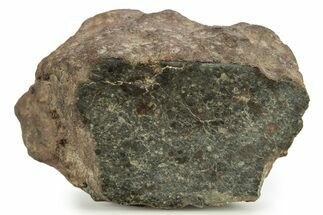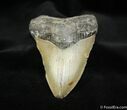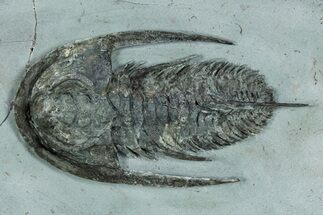This Specimen has been sold.
Facebook Contest Prize: 4 1/2 Megalodon Tooth
Win This MEGALOGON Tooth!
To help celebrate #FossilFriday we are running a series of fossil giveaways on our various social media accounts (Facebook, Twitter, Google+ and Pinterest). This is the prize for today's Facebook contest that will run for 24 hours from noon (PST) on Friday.
To enter go to our Facebook Page, find the contest post and like it or leave a content. After the contest ends we will randomly select a winner and contact them via Facebook messaging. If you have any questions about the contest just leave a comment there.
Be sure to like our page if you haven't yet as we will be regularly running contests, special offers as well as providing updates on new listings.
Other #FossilFriday Contests
We're running similar contests on Twitter, Google+ and Pinterest concurrently so check them out also.
Trilobite For Twitter
Fossil Fish For Google+
Fossil Ammonite For Pinterest
Now About The Tooth
The tooth itself is an authentic 4 1/2 inch long Megalodon tooth collected from the Pungo River Formation on North Carolina. It includes the pictured stand to display it.
To help celebrate #FossilFriday we are running a series of fossil giveaways on our various social media accounts (Facebook, Twitter, Google+ and Pinterest). This is the prize for today's Facebook contest that will run for 24 hours from noon (PST) on Friday.
To enter go to our Facebook Page, find the contest post and like it or leave a content. After the contest ends we will randomly select a winner and contact them via Facebook messaging. If you have any questions about the contest just leave a comment there.
Be sure to like our page if you haven't yet as we will be regularly running contests, special offers as well as providing updates on new listings.
Other #FossilFriday Contests
We're running similar contests on Twitter, Google+ and Pinterest concurrently so check them out also.
Now About The Tooth
The tooth itself is an authentic 4 1/2 inch long Megalodon tooth collected from the Pungo River Formation on North Carolina. It includes the pictured stand to display it.
About The Megalodon Shark
The megalodon was not only the biggest and baddest prehistoric shark that ever lived, it was the largest marine predator in the history of the planet. Today’s great white sharks would be a mere bite-size snack for this monster. It terrorized the diverse ocean waters around the world from 15.9 to 2.6 million years ago, from the late Oligocene to the early Pleistocene. This massive and extinct species of shark was estimated to grow to nearly 60 feet in length and has often been declared the greatest vertebrate predator that ever lived.
These mega-toothed sharks were a giant and more robust version of the great white. They had 276 teeth in 5 rows and, like today's sharks, shed their teeth throughout their lifetime. The largest megalodon teeth on record reached a staggering 7.5 inches (190mm)! Compare this to the largest great whites, whose teeth top out around 3 inches long. Wow!
Their teeth were bone-crunching and flesh-cutting tools evolved for grasping powerful prey such as baleen whales. Fossil evidence supports that megalodon focused its attack on the hard, bony parts of its prey, such as rib cages, flippers, shoulders, and spines, effectively disabling large whales and harming major organs such as the heart and lungs. This strategy explains their thick, robust teeth.
Megalodon had a cosmopolitan (global) distribution and its giant teeth can be found in deposits throughout the world. Some are collected on land in phosphate deposits, while many are collected from rivers and coastlines after eroding out of the rocks. This contributes to the water-worn, polished appearance of many teeth.
The standard measure for megalodon teeth is slant height, or the longest edge of the tooth. Adult megalodon teeth were typically in the 4 to 5 inch range: teeth over 6 inches are rare and represent super-sized individuals. Only a handful of teeth have ever been found over seven inches.
No one knows for sure why the megalodon went extinct 2.6 million years ago, but the cooling of the climate and gradual disappearance of many of the large whales it relied on for food are suspects.
The megalodon was not only the biggest and baddest prehistoric shark that ever lived, it was the largest marine predator in the history of the planet. Today’s great white sharks would be a mere bite-size snack for this monster. It terrorized the diverse ocean waters around the world from 15.9 to 2.6 million years ago, from the late Oligocene to the early Pleistocene. This massive and extinct species of shark was estimated to grow to nearly 60 feet in length and has often been declared the greatest vertebrate predator that ever lived.
These mega-toothed sharks were a giant and more robust version of the great white. They had 276 teeth in 5 rows and, like today's sharks, shed their teeth throughout their lifetime. The largest megalodon teeth on record reached a staggering 7.5 inches (190mm)! Compare this to the largest great whites, whose teeth top out around 3 inches long. Wow!
Their teeth were bone-crunching and flesh-cutting tools evolved for grasping powerful prey such as baleen whales. Fossil evidence supports that megalodon focused its attack on the hard, bony parts of its prey, such as rib cages, flippers, shoulders, and spines, effectively disabling large whales and harming major organs such as the heart and lungs. This strategy explains their thick, robust teeth.
Megalodon had a cosmopolitan (global) distribution and its giant teeth can be found in deposits throughout the world. Some are collected on land in phosphate deposits, while many are collected from rivers and coastlines after eroding out of the rocks. This contributes to the water-worn, polished appearance of many teeth.
The standard measure for megalodon teeth is slant height, or the longest edge of the tooth. Adult megalodon teeth were typically in the 4 to 5 inch range: teeth over 6 inches are rare and represent super-sized individuals. Only a handful of teeth have ever been found over seven inches.
No one knows for sure why the megalodon went extinct 2.6 million years ago, but the cooling of the climate and gradual disappearance of many of the large whales it relied on for food are suspects.
SPECIES
Otodus megalodon
LOCATION
North Carolina
FORMATION
Pungo River Formation
SIZE
4.58"
CATEGORY
SUB CATEGORY
ITEM
#1179
We guarantee the authenticity of all of our specimens.
 Reviews
Reviews













